New Washington Consensus und die Neuen Seidenstraßen der USA und der EU: B3W und Global Gateway
Recht Paradigmatisches ändert sich: Der alte Washington Consenus der neoliberalen Deregulierung, Privatisierung und Globalisierung wird abgelöst von einem New Washington Consensus, der mehr wirtschaftsnationalistisch, keynesianistisch und industriepolitisch angelegt ist und nicht mehr dem alten neoliberalen Credo folgt, dass die Märkte alles regeln sollten und internationale Institutionen, in die man möglichst viele Staaten der Welt unter gemeinsamen Regeln hineinbringen solle, sondern verstärkt auf America First sowohl unter Trump wie auch Biden setzt. The Atlantic weist auf diesen scheinbar angeblich noch nicht so registrierten Wechsel in einem Artikel hin:
“The New Washington Consensus
Both Trump and Biden have positioned themselves as economic nationalists, self-consciously abandoning the precepts of the old order.
Earlier this month, National Security Adviser Jake Sullivan delivered a speech at the Brookings Institution that historically would have made for front-page material but barely registered in the world beyond wonkdom. His address was a muscular statement of ideological intent.
He argued that President Joe Biden’s agenda channeled a set of ideas Sullivan called the “new Washington consensus.” There was a bit of cheek in his use of that term. The Washington Consensus was a phrase that entered circulation at the very end of the 1980s, describing the emerging bipartisan faith in globalization, deregulation, and the wisdom of markets, suited to an era of optimistic triumphalism. But that era is ending. Or, as Sullivan put it, “The last few decades revealed cracks in those foundations.”
What Sullivan championed in the speech was something like the antithesis of that old paradigm. He said that ever-greater global interdependence is no longer desirable. One reason is China, which participates in global capitalism without fairly playing by its rules. Another is the realization, exposed by the pandemic-induced crisis in the intricate global supply chain, that the American economy is vulnerable to even small disruptions on the other side of the planet. That crisis was an indication that the world has gone too far in a libertarian direction and needs the sort of regulation and government investment that only a short while ago were highly unfashionable in the Washington policy sphere.
Remarks by National Security Advisor Jake Sullivan on Renewing American Economic Leadership at the Brookings Institution April 27, 2023
The Biden administration’s international economic agenda: A conversation with National Security Advisor Jake Sullivan
Wobei es da natürlich immer noch Unterschieden zwischen Republikanern und Demokraten und vor allem Biden und Trump gibt, zumal Biden den Green New Deal und das Megainfrastrukturprojekt B2W unterstützt, während Trump Klimawandel und Ökologie völlig egal ist wie auch irgendwelche erhofften Dekarboniserungen, sondern weiter eifrig auf Öl. Gas und Stahl sowie alte Industrien setzt und auch das Projekt einer US- amerikanischen Neuen Seidenstrasse B3W nicht einmal angedacht hat, noch ihm eine internationale Ausrichtung geben will. Was sich aber noch ändern könnte, falls ihn einer überzeigten könnte, dass Infrastrukturprojekte auch in anderen Ländern wichtig seien, allein schon, weil man ein Gegenprojekt zu Chinas Seidenstraße BRI haben solle, das vielleicht auch noch Jobs und Gewinne in und für Amerika abwirft.Aber bisher konzentriert sich Bidens Neue Seidenstrasse auch mehr auf die USA, hat nicht einmal eine panamerikanische , bzw. lateinamerikanische Dimension.Dennoch muss man konstantieren, dass mit dem Abschied vom alten Washingtoner Consensus und Neoliberalismus nun auch wieder keynesianistische Infrastrukturprojekte und Industriepolitik möglich wird, wie etwa auch beim IRA (Inflation Reduction Act) sichtbar wird.
Auch in der EU kommt es nun zu einem Sinneswandel. Nachme infolge des Neoliberalismus in Europa seit den 90er Jahren die Infrastruktur verkommen lassen wurde, das Bahnsystem privatisiert und zertrümmert wurde, der damalige Delorplan, der ein gesamteuropäsiches Verkehrs- und Infrastrukturnetz vor allem auch über Bahnstrecken vorsah, gestrichen wurde, inzwischen aber das Wort vom Infrastrukturinvestitionsstau in den USA, der EU, aber auch weltweit immer mehr an Bedeutung gewann, die KP China da visionär ihre One Belt One Road-(OBOR)- Initiative einer Neuen Seidenstrasse seit 2013 offiziell weltweit vorantreibt, die nun in BRI umbenannt wurde und welche in die strategische Triade Global Development Initiative mit Schwerpunkt BRI, Global Security Initiative und Global Civilization Initiative unter den Xi Jinping- Gedanken eingebettet wurde, kommen mit einem Jahrzehnt Verspätung und reaktiv seitens der USA und der EU die ersten Reaktionen. Schon vor einigen Jahren fragte die FAZ damals zumeist noch völlig unbeachtet in einem Artikel „Warum keine europäische Seidenstraße?“. Nun hat die Bidenadministration eine US- amerikanische Seidenstraße beschlossen: B3W und die EU eine europäische Seidenstraße Global Gateway mit einem Investitionsvolumen von 360 Milliarden Euro. Dennoch fällt auf, dass dies in den westlichen Medien keinerlei Thema ist, noch von Politikern jemals groß erwähnt wird- anders als die KP China und ihre Global Times, in der fast täglich von ihrem Jahrhundertprojekt zu lesen ist und die dies auch überall bekannt macht und offensiv in ihrer Propaganda. Auf der Webseite von Global Gateway sind auch nur spärlich Informationen und unlängst fragte eine CDU- Parlamentarierin in einer Bundestagdebatte als Einzelbeitrag geradezu verzweifelt, warum die deutsche Regierung und die EU eigentlich nie Global Gateway offensiv vorstellen, propagieren oder damit werben wie die Chinesen es tun. Zumindestens manchmal taucht etwas in der internationalen Presse zu B3W und Global Gateway auf, wie folgende Beispiel zeigen. Interessant aber auch, dass über Global Gateway und das Indopazifiktreffen der EU mal nur die Taipeh Times berichtet. Deutsche Medien haben da mal wieder Funkstille.
„Mon, May 15, 2023 page5
EU wants more say in China’s backyard
INDO-PACIFIC FOCUS: The EU plans to pursue 20 Global Gateway projects in the region, while France said that it would send frigates to patrol there more often
Bloomberg
The EU on Saturday offered closer political and investment ties to 20 countries from across the Indo-Pacific region, as the bloc seeks more influence despite growing Chinese and US ambitions.
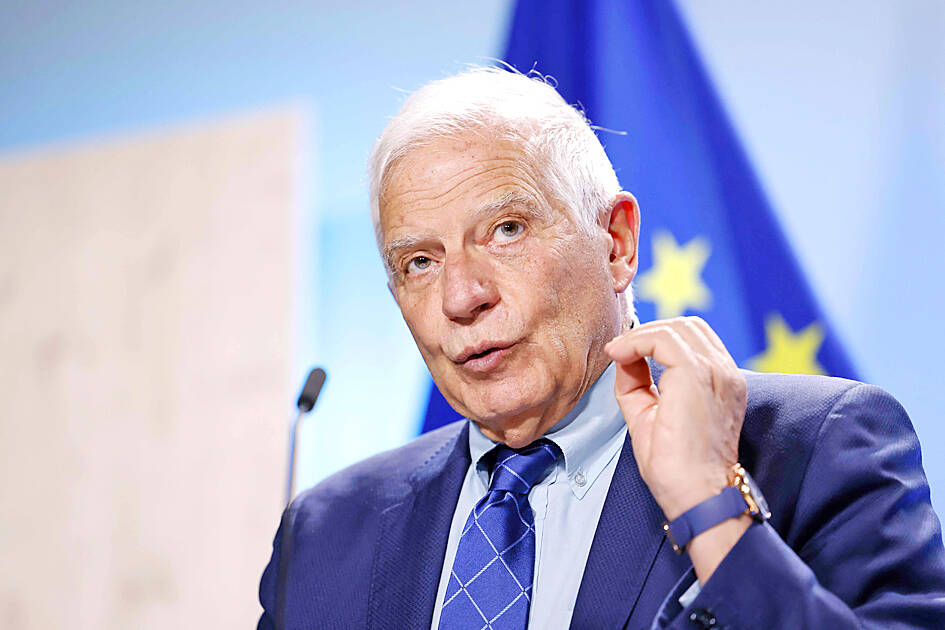
EU High Representative for Foreign Affairs and Security Policy Josep Borrell speaks at a news conference in Marsta, Sweden, on Saturday
At a forum that gathered foreign ministers from the EU and the Indo-Pacific, several speakers touted the Global Gateway program, Europe’s answer to China’s massive infrastructure project, the Belt and Road Initiative. The meeting on Saturday was itself a snub to Beijing, which was not invited.
“Our ambition is to work toward the preservation of the Indo-Pacific as a free, open, prosperous and inclusive region, and to build partnerships between equals,” French Minister of Europe and Foreign Affairs Catherine Colonna said in a speech.
The EU “refuses to enter a logic of blocs that would make escalation and, eventually, confrontation, inevitable,” she said.
After decades of viewing China primarily as a commercial opportunity, the EU is seeking to boost its footprint in the region and reduce its reliance on imports from the world’s second-biggest economy, including on raw materials critical for the bloc’s green transition.
The EU’s dependence on Beijing, whose leader, Chinese President Xi Jinping (習近平), has declared a “no limits” friendship with Russian President Vladimir Putin, was laid bare during the COVID-19 pandemic, when countries and companies scrambled to source masks and other equipment.
Russia’s invasion of Ukraine has heightened tensions with the West pressing Beijing to distance itself from Moscow.
The EU first adopted a common strategy on the Indo-Pacific in 2021 pushed by France, which has overseas territories in the area.
Ending Saturday’s forum, whose guests included India, Japan and Indonesia, EU High Representative for Foreign Affairs and Security Policy Josep Borrell said the bloc wants “to step up our engagement to deliver more concrete results on the ground.”
Borrell said the EU would pursue 20 Global Gateway projects in the Indo-Pacific “from investment in hydropower, solar energy plants to transportation infrastructure, railways, ports and airports.”
The EU late last year signed an agreement with Thailand to foster a bilateral dialog on energy, climate change and other issues.
While Colonna did not mention China, she said the Global Gateway strategy was meant to promote “lasting, quality infrastructure projects that don’t put countries in a situation of dependence,” including in the digital sector.
Colonna also said that French frigates would patrol more often in the region.
A French warship patrolled the Taiwan Strait last month, while China conducted military exercises in the area.
France did not invite US representatives last year, but Washington was represented on Saturday.
Paris deems the Indo-Pacific a priority. The region hosts about 1.6 million French citizens and France has a military presence in French overseas islands, including New Caledonia, Wallis-and-Futuna or Mayotte, and 8,000 soldiers.
https://www.taipeitimes.com/News/world/archives/2023/05/15/2003799827
Auch die USA haben sich noch nicht zurückgezogen und werden nun nach dem SA- Irandeal unter chineischer Vermittlung im Nahen Osten aktiv. . Zum einen haben sie noch immer ihr CENTCOM- Hauptquarter in Katar, in Nordsyrien eine ölreiche Enklave besetzt, mit der sie mit den kurdisch- dominierten Syrian Defense Forces (SDF) gegen den IS kämpfen, mit Indien, Israel den UAE das Bündnis I2U2 geschaffen und nun machen sie mit einem eigenen Eisenbahnprojekt der chinesischen Neuen Seidenstrasse BRI Konkurrenz:
“Senior US official in Saudi Arabia to discuss massive rail project with UAE, India
Israel reportedly not invited as National Security Adviser Jake Sullivan arrives in kingdom shortly after Riyadh reaches agreement with Iran
By Lazar Berman 7 May 2023, 6:33 pm

White House national security adviser Jake Sullivan speaks during the daily briefing at the White House in Washington, December 12, 2022. (Susan Walsh/AP)
A senior White House official was in Saudi Arabia on Sunday to discuss a massive infrastructure project with key Israeli allies, but without Israel at the table, according to reports.
National Security Adviser Jake Sullivan is slated to met his Saudi, Emirati, and Indian counterparts, Axios reported on Saturday night. The four officials will discuss a rail and port network linking the Gulf states and India.
The idea reportedly arose during meetings of the I2U2 forum, which includes Israel, India, the US, and UAE, though Israel was not part of Sunday’s discussion.
Foreign Minister Eli Cohen is flying to India on Monday to meet with Prime Minister Narendra Modi and Foreign Minister Subrahmanyam Jaishankar.
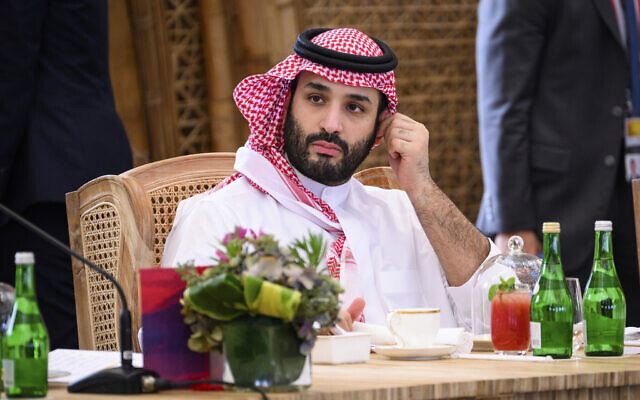
File: Crown Prince Mohammed bin Salman of Saudi Arabia takes his seat ahead of a working lunch at the G20 Summit, Nov. 15, 2022, in Nusa Dua, Bali, Indonesia (Leon Neal/Pool Photo via AP, File)
Sullivan spoke by phone to Saudi Arabia’s de facto ruler, Crown Prince Mohammed Bin Salman, on April 11. He is expected to meet MBS on the current trip to discuss bilateral relations and the possibility of normalization with Israel.
Last Thursday at the Washington Institute for Near East Policy, a DC thinktank, Sullivan hinted at Sunday’s discussions, referencing “new areas of cooperation between New Delhi and the Gulf as well as the United States and the rest of the region.”
File: Crown Prince Mohammed bin Salman of Saudi Arabia takes his seat ahead of a working lunch at the G20 Summit, Nov. 15, 2022, in Nusa Dua, Bali, Indonesia (Leon Neal/Pool Photo via AP, File)
The China challenge
Sullivan, the first senior US official to visit the kingdom since President Joe Biden made the trip last summer, arrived only weeks after Riyadh reached an agreement on restoring full diplomat ties with Iran under Chinese auspices.
The move toward China is widely seen as a signal from the Saudis to Washington that it is displeased with US pressure on human rights, and its perceived disengagement from the Middle East.
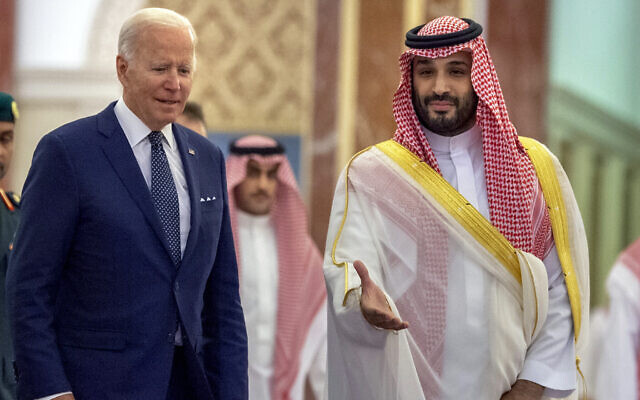
Saudi Crown Prince Mohammed bin Salman, right, welcomes US President Joe Biden to Al-Salam Palace in Jeddah, Saudi Arabia, July 15, 2022. (Bandar Aljaloud/Saudi Royal Palace via AP, File)
The message seems to have been understood in the Biden administration. US Secretary of State Antony Blinken will follow Sullivan with a June trip to Saudi Arabia to join a meeting of the Global Coalition to Defeat ISIS.
China has been developing major infrastructure projects across the region as part of its Belt and Road Initiative. The I2U2 forum, and the potential rail project, are part of a US response.
Saudi Crown Prince Mohammed bin Salman, right, welcomes US President Joe Biden to Al-Salam Palace in Jeddah, Saudi Arabia, July 15, 2022. (Bandar Aljaloud/Saudi Royal Palace via AP, File)
The Chinese project also poses a major challenge to India, as its Chinese rival seeks to capture a far greater share of trade flows from Africa, the Middle East, Central Asia and Europe.
New Delhi, which sees China’s modern Silk Road scheme as a curb on its own growth and international trade, initially sought to avoid being hemmed in by creating its own corridor to Central Asia via Iran, and then on to Europe.
But the project — known as the International North-South Transit Corridor — has been a failure.
With the signing of the Abraham Accords in 2020, India was presented with a new opportunity to challenge Chinese designs on regional and global trade.
Israel would seem a natural partner to a US-led initiative. Rail networks between Israel and the UAE would allow India to ship goods to the UAE, which would then be spirited by train across Saudi Arabia and Jordan, before crossing into Israel at Beit She’an and arriving at the Haifa port.
From there, goods would be shipped to Greece’s Piraeus port, one of the largest in Europe, from which India would be able to access the entire continent.
Economic ties between the UAE and India are already robust. India is the largest importer of Emirati goods, and the UAE is India’s third-largest trade partner. Emirati companies invested billions of dollars to create the India-UAE Food Corridor last year in order to bolster the Gulf country’s food security.
India aims to become the breadbasket of the Middle East, and Israel is at the center of that ambitious goal. The Foreign Ministry has created 29 Indo-Israel Centers of Excellence to improve yields, water use, and crop diversity.
With no formal ties between Israel and Saudi Arabia, Jerusalem is sitting out Sunday’s talks with Sullivan.
While Saudi officials have privately expressed interest in such an agreement in recent years, the prospects of Israeli-Saudi normalization remain distant.
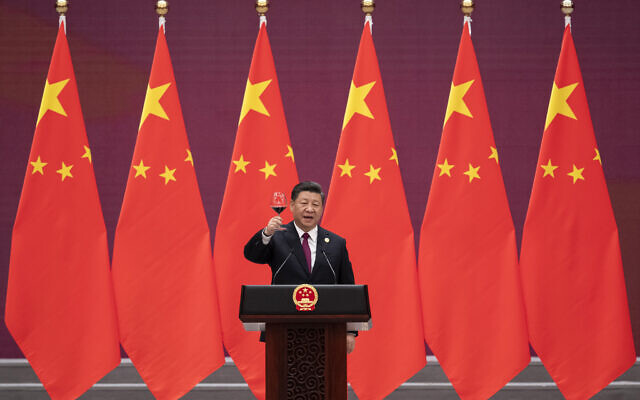
Chinese President Xi Jinping raises his glass and proposes a toast during the welcome banquet for visiting leaders attending the Belt and Road Forum at the Great Hall of the People, April 26, 2019. (Nicolas Asfouri/Pool Photo via AP)
Riyadh has presented extensive demands to the United States regarding major improvements to their bilateral relationship as a prerequisite for a deal. Prime Minister Benjamin Netanyahu’s hardline government, which has already garnered blistering condemnations from the Gulf kingdom over its policies toward the Palestinians, has made normalization less palatable to either the palace or the street.
Nonetheless, the current US government has made some progress, including on issues that eluded the administration of former US president Donald Trump, which brokered the Abraham Accords.
Last year, the White House brokered the final stages of a deal to transfer control over a pair of Red Sea islands from Egypt to Saudi Arabia, leading to Riyadh opening its airspace for civilian flights to and from Israel. It later coaxed Oman to do the same, shrinking the time required for Israelis to fly to the Far East.
On Thursday at the Washington Institute, Sullivan said that the US sees a benefit to its national security in brokering a normalization agreement between Israel and Saudi Arabia.
Wütend kommentiert die Global Times, dass die USA in Sachen Infrastrukturbau ja ein Dritte- Weltland sei, wenn man sich ihr eigenes Land ansehe, China nur kopieren würden, zumal 18 Jahre lang das geplante Projekt ruhen ließen, zudem nicht uneigennützig wie China zum win-win-Wohl aller handele, sondern nur um China einzukreisen und einzudämmen und dies eine Reaktion auf den chinesischen SA- Iran-Deal sei:
US railway plan a mere copycat, hard to win favor from Middle East
By Global Times Published: May 08, 2023 08:27 PM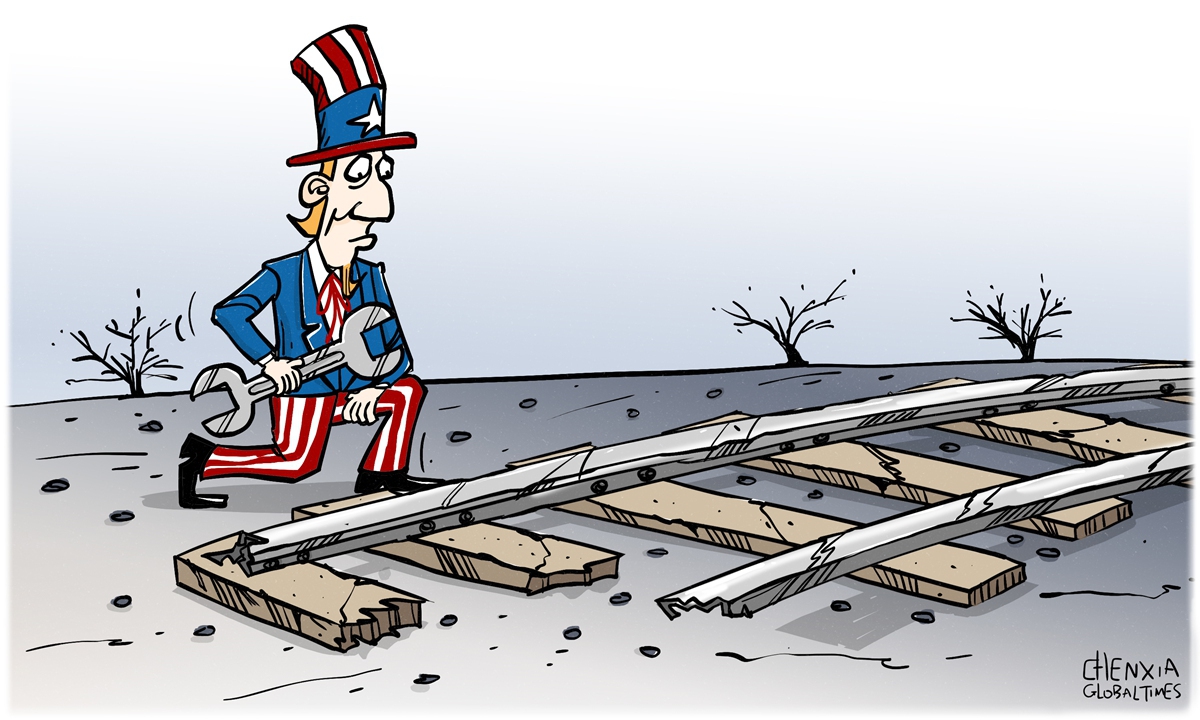
Illustration: Chen Xia/Global Times
According to media reports, national security advisors from the US, India, Saudi Arabia and the UAE met in Saudi Arabia on Sunday to discuss a US proposal to link the Middle Eastern nations through a network of railway lines and connect the region to South Asia via sea lanes.
US media outlet Axios, which ran an exclusive report before the talks, said, „The project is one of the key initiatives the White House wants to push in the Middle East as China’s influence in the region grows. The Middle East is a key part of China’s Belt and Road vision.“
Xu Liang, an associate professor at the School of International Relations, Beijing International Studies University, told the Global Times that the US is trying to coordinate its Middle East policy with its South Asia policy, thereby creating a US-style railway plan in the Middle East that is different from China’s initiative.
„This is the revival of the Cold War mentality in the Middle East. The plan is a deliberate containment of China’s Belt and Road Initiative,“ said Xu.
China has been engaging with the Middle East through the Belt and Road Initiative for years. Its peacemaker role in the recent Saudi-Iran detente has been lauded by the international community, countries in the region in particular, and injected momentum of stability to the region. All these trajectories have deeply worried the US.
The idea for the railway project germinated in the I2U2 forum 18 months ago, which includes Israel, India, the US and the UAE. Wen Jing, a postdoctoral fellow at the Center for International Security and Strategy, Tsinghua University, told the Global Times that I2U2 was relatively quiet since its formation, but after the US saw China’s successful mediation in the Saudi-Iran deal, I2U2 is now becoming active with the discussions of the railway plan. „I2U2, together with Quad and AUKUS, constitutes the US‘ global strategy to contain China,“ said Wen.
Ding Long, a professor with the Middle East Studies Institute of Shanghai International Studies University, believes that the US is saving its declining influence in the region with something it is not good at, which will make the US‘ rail plan hard to achieve its desired goal.
According to a report released by the American Society of Civil Engineers in 2021, the US spent just over half of what was required to support infrastructure, the backbone of the economy. Even former US president Donald Trump once compared the US‘ crumbling infrastructure to that of a third-world country. US President Joe Biden signed a $1 trillion infrastructure bill into law at the end of 2021, while a Politico article in mid-2022 said the inflation plaguing Biden’s presidency was also shrinking what’s so far been his crowning legislative achievement, referring to the infrastructure bill.
It is worth mentioning that the victims of the calamitous train derailment accident in East Palestine, Ohio, are still suffering. There were at least 1,164 train derailments across the US last year, according to data from the Federal Railroad Administration. Here is another startling data: The Bureau of Transportation Statistics found that 54,539 train derailments occurred in the US from 1990 to 2021, an average of 1,704 per year. If there is something that the US could export to the Middle East besides its „democracy“ and „freedom,“ it must be the freedom to derail.
The US, the most powerful country in the world, performs so poorly in terms of railway construction and infrastructure. As it’s now trying to woo Middle Eastern nations to establishment a network of railway lines, it is a mere copycat. While connectivity and win-win cooperation are in China’s mind when it is promoting infrastructure, what is in the mind of the US is countering its perceived rivals and sustaining its global hegemony.
„In terms of the technology and costs of building railways, no other country in the world than China has the prominent advantage. What the Middle Eastern countries want from the US is not a railway, but security. However, the US did not and could not bring security to the region, but messed up the security situation there. This is the dilemma the US is facing in the Middle East,“ said Ding.
Now the Middle East is witnessing a strong wave of rapprochement. The reconciliation between Saudi Arabia and Iran under China’s mediation presents an alternative vision to the Middle Eastern geopolitical scene. Qatar and Bahrain reestablished diplomatic relations. Egypt and Turkey are also mending ties. Progress is made in Yemen’s peace talks. Just on Sunday, the Arab League has brought Syria back into its fold after 12 years. All these show that the US‘ Middle Eastern allies do not act in accordance with the US‘ playbook.
„They care more about their interests, and aren’t following US lecturing. As their independence and autonomy is increasing, the Middle Eastern countries will not buy into US tactic of forming small cliques,“ said Ding.
https://www.globaltimes.cn/page/202305/1290331.shtml
Wie Mao einmal sagte: „Wenn der Feind schreit wir sind böse, dann ist das gut“.